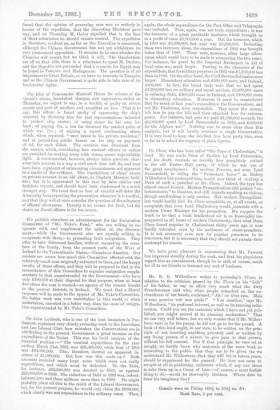Mr. R. G. Wilberforce writes to yesterday's Times, in relation
to the criticism passed by the Times on his "Life" of his father, to say in effect very much what the dirty Frenchwoman said who, when people remarked on the un- cleanliness of her hands, exclaimed, " Ah ce n'est rien. Mais si vous pousriez voir mes pieds !" "You mention," says Mr. Wilberforce, "its profound interest, as well as its amazing indis- cretion. Could you see the materials which I have not yet pub- lished, you might marvel at its amazing moderation." That we can very well believe, but we only wonder that if Mr. Wilber- force went in for the penny, he did not go in for the pound. A book of this kind ought, in our view, to be written on the prin- ciple of not inserting anything privately said or written by. any living person of a nature to give pain to that person, without his full consent. But if that principle be once set at naught, we hardly know why materials of the same kind, so interesting to the public that they are to be given (as we understand Mr. Wilberforce, that they will be) in future years, should be suppressed. for the present. He does not seem to scruple at all at publishing criticisms which, if any one chose to take them up in a Court of Law,—of coarse, a most foolish thing to do,—would be thoroughly libellous. Where does he draw his imaginary line P

































 Previous page
Previous page